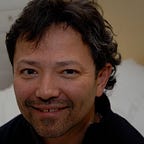Deleuze and Fragmentation 3
Perspectivism and the 20th Century: Grand Narratives
Filling the Void
In a relatively short period of history, a plethora of ideas and expressions sought to understand human experience from alternative perspectives, at all times embracing the creative and open.
But this creativity was also borne out of, and was an extension of, the Enlightenment belief in progress and man over nature.
Humanity would fill the void of perspectivism, and art, literature and philosophy were exercises in seeking out a new ordering that would provide a canopy for experience.
What began as a plurality of ideas had one objective in common: to unlock the mystery of experience; to find the one answer to the question of how to interpret life.
Structuralism
Structuralism, as both a philosophical and cultural movement, gave rise to grand narratives in relation to experience, linguistics, and the psychoanalytical.
Lurking beneath this new freedom was a common desire to restore meaning in life, often harking back to the mythological fragments of the human story.
Fragmentation of sensation, perception, intuition and thought were explored, but at all times in the context of a consciousness of the dangers relativism and nihilism.
In physics, Albert Einstein dismissed the findings of quantum theory, that particles could seemingly be in two places at once, that their behavior was related to the observer, that we could only hope to discover a probabilistic understanding of physical reality.
He famously asserted, “God does not play dice.”
There is a single theory of everything, we just have not evolved to the point of coming to that understanding.
There is a single key to the workings of the universe, and when we find it we, humanity, will be rightfully restored to the seat of god.
Utopia
Utopian ideologies informed the two greatest historical tragedies of the century, and would go on to change history forever.
Both Marxism and Fascism rejected the incremental and embraced the telos of a brave new world.
Both would lead to an end of history: Marxism via the rise of a universal classless society and the dissolution of the state; Fascism via absorption in the organicism of the state and a dissolution of the individual.
Both led to terror and genocide unimaginable, in the name of a unified vision or essence, a single theory of everything political; a universal, transcendent delusion that abstracted from the multiple and particular in life, and in doing so denigrated all that is immanent, open and alive.
The Hollow Men
Moderns sought the sacred in the secular, were at all times seeking the holy grail of meaning.
They did this through art, thought and ultimately through utopian political visions leading to monstrous result.
In just over three decades, optimism and hope slid into pessimism and fear. The attempt to find universal meaning surrendered to relativism and nihilism.
All of this culminating in the discovery of the horrors of Auschwitz and the extent of the final solution, as well as the dropping of two atomic bombs; announcing humanity’s technological capability and ethical proclivity for acting in aid of nothingness and the extinction of the species: a realist expression of nothingness.
Shape without form, shade without colour,
Paralysed force, gesture without motion (TS Eliot)
A new skepticism arose. The ideas expounded in Heart of Darkness, written years prior by Joseph Conrad, took hold.
If we look closely enough inside our hearts and minds, there is nothing other than primitive terror and violence.
There is no meaning in life beyond our vicious origins.
The search for unity and universality, the abstract concept transcending the universe and all of life, had led to nothingness.
And so we arrive at abstract art, and a lack of any human subject or other life worth portraying. All sense of something alive and open vanishes behind the universality of solid lines and colors; the expression of subject deemed nothing more than an exercise in futility.
I hope you enjoyed this article. Thanks for reading!
Tomas
Please join my email list here or email me at tomas@tomasbyrne.com.
Excerpt from my forthcoming book, Becoming: A Life of Pure Difference (Gilles Deleuze and the Philosophy of the New) Copyright © 2021 by Tomas Byrne. Learn more here.
